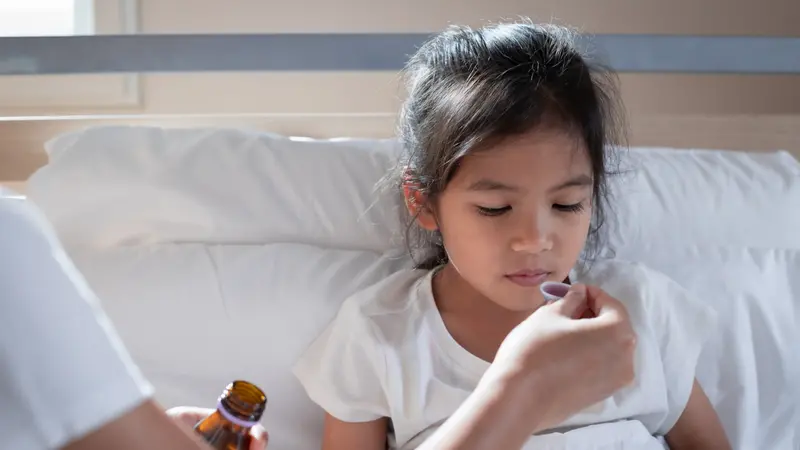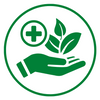

Natural

Natural
Children’s Cough Medicines: Are They Effective?
Although it may be common to reach for cough medication for your children when they develop a cough, there is little evidence that such medications are more effective at easing symptoms than home remedies, and potential side effects may outweigh any benefits.
Physicians’ recommendations of cough and cold medications (CCM) have steadily declined in the United States since 2002. According to the American Academy of Allergy Asthma and Immunology (AAAAI), coughs protect a child’s body by removing mucus, irritating substances, and infections from the respiratory tract. The AAAAI states that most over-the-counter cough medications are not thought to be particularly effective and that for a daytime cough following a viral respiratory infection, the cough doesn’t usually need any specific treatment, especially if it goes away in one or two weeks.
The Food and Drug Administration (FDA) has recommended against over-the-counter (OTC) cough medication for children under the age of two since 2008, as the side effects could be serious and potentially life-threatening, and manufacturers voluntarily labeled CCM for children 4 years and older shortly thereafter. The American Academy of Pediatrics recommends avoiding CCM in children younger than 6 years.
A 2018 review of the evidence that looked at 29 trials involving 4,835 people (adults and children) validated concerns about the safety and efficacy of CCM. In the child studies, antitussives, antihistamines, antihistamine-decongestants, and antitussive/bronchodilator combinations were no more effective than placebo. Twenty-one studies reported adverse effects, and there were higher numbers of adverse effects in participants taking antihistamines and dextromethorphan (DM).
Types of CCM
The types of CCM and their targeted responses include:
- Nasal decongestants—unclog a stuffy nose
- Expectorants—loosen mucus in the lungs so it can be coughed up
- Cough suppressants—reduce the frequency of coughs
- Antihistamines—stop sneezing and runny nose
- Pain relievers—ease headaches, aches, pains, and fever.
A 2017 systematic review by an expert panel from the American College of Chest Physicians concluded that the following medications should not be used to treat a child’s cough:
- OTC cough and cold medicines
- Medications containing codeine
- NSAIDs (aspirin, ibuprofen, and naproxen sodium)
- DM for children under the age of 4
The researchers suggest against the use of OTC CCM until they have been shown to make cough less severe or resolve sooner, and that honey may offer more relief for cough symptoms than no treatment, diphenhydramine, or placebo, but that it is not better than DM.
Home Remedies
Home remedies to ease symptoms and help a child feel more comfortable include:
- Fluids—Children should drink plenty of clear fluids while they have a cough, and warm drinks for a sore throat.
- Menthol rubs—Menthol has been shown to improve the nasal sensation of airflow and may lead to improved sleep.
- Cool-mist humidifiers—Can help keep the airways moist and make it easier to cough up congestion.
- Honey— For children over the age of 12 months, honey can help thin secretions and loosen the cough. Use ½ to 1 tsp (2—5mL) as needed, either from a spoon or dissolved into warm water.
- Saline nose drops or sprays—Help clear the nasal passages and may reduce cough frequency from post-nasal drip. After using a saline product, parents can use a bulb syringe to clear the mucus from a child’s nose.
Coughs can last up to two weeks if caused by a viral infection, and most will improve without medication. If symptoms worsen or a child has a persistent fever, pain, or difficulty breathing, they should receive medical attention.
REFERENCES
American Academy of Allergy Asthma and Immunology. (2020, September 28). Cough in children. https://www.aaaai.org/Tools-for-the-Public/Conditions-Library/Allergies/cough-in-children
Ames, H. (2022, March 27). Do cough medicines for children work? Medical News Today. https://www.medicalnewstoday.com/articles/cough-medicine-for-kids
Horton, D., Gerhard, T., Strom, B. (2019, July 29). Trends in cough and cold recommendations for children in the United States, 2002-2015. JAMA Pediatrics. https://jamanetwork.com/journals/jamapediatrics/fullarticle/2740225
Malesker, M., Callahan-Lyon, P., et. al. (2017, November). Pharmacologic and nonpharmacologic treatment for acute cough associated with the common cold. National Institutes of Health. National Library of Medicine. National Center for Biotechnology Information. https://www.ncbi.nlm.nih.gov/pmc/articles/PMC6026258/
Smith, S., Schroeder, K., Fahey, T. (2014, November 24). Over-the-counter (OTC) medications for acute cough in children and adults in community settings. National Institutes of Health. National Library of Medicine. National Center for Biotechnology Information. https://pubmed.ncbi.nlm.nih.gov/25420096/


 By
By







